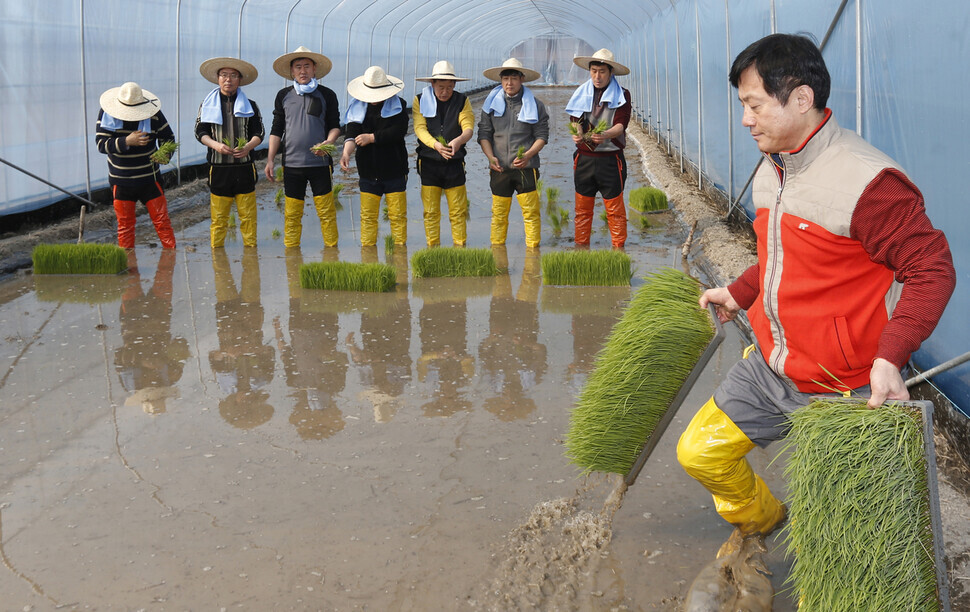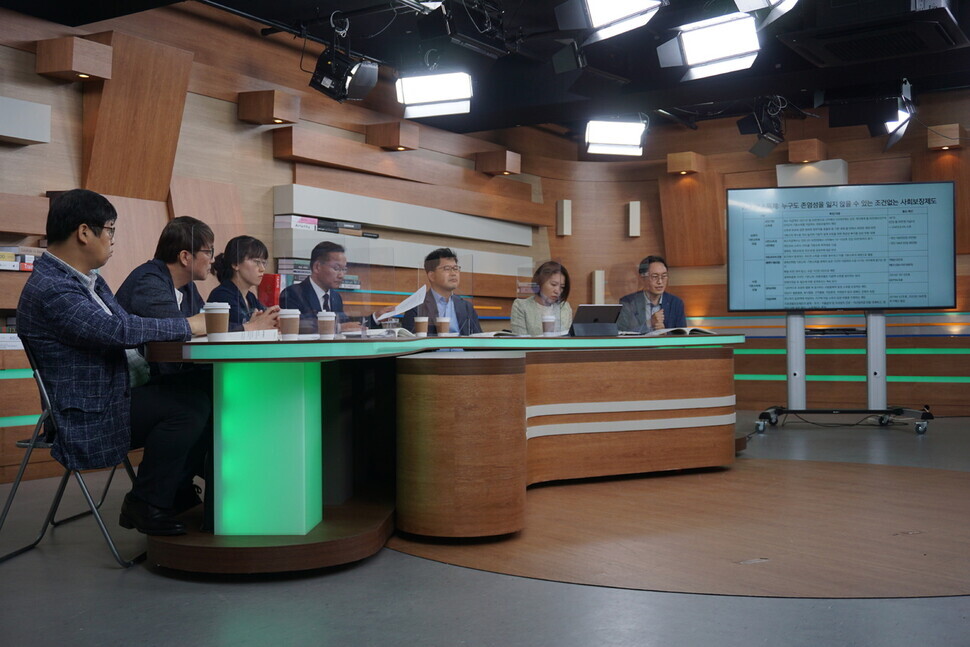hankyoreh
Links to other country sites 다른 나라 사이트 링크
Can spirited debate over rural basic income lead to success?

As Gyeonggi Province gears up to run an experiment in rural basic income in the second half of the year, a debate about the various issues and challenges facing the program was held at the office of the Hankyoreh newspaper on June 8.
The debate was part of the 3rd Rural Basic Income Policy Forum, which focused on the topic of “Issues and Challenges for Rural Basic Income in the Era of Basic Income, a Variously Defined Concept.” The forum was organized by the Hankyoreh Economy and Society Research Institute, the Gyeonggi Agrofood Institute, the Basic Income Korean Network, LAB2050, the Institute of Governmental Studies at Korea University, the Korea Regional Development Foundation, the National Assembly’s Basic Income Research Forum, and the Gyeonggi Provincial Assembly’s Basic Income Research Forum.
The forum’s schedule consisted of research presentations and an issue debate that lasted for 100 minutes.
The day’s first research presentation was delivered by Kim Ja-kyung, a research professor, and Lee Jae-sub, a researcher, both at the SSK Research Center on the Commons and Sustainable Society at Jeju National University. Kim and Lee presented case studies in the distribution of profit from natural resources on islands such as Jeju and Janggo, a small island near the city of Boryeong, South Chungcheong Province.
“While the distribution structure for common resources is different from that of basic income, previous examples of successful distribution of common resources can allow us to predict the efficacy of rural basic income,” said Kim and Lee, who pointed out that profit distribution revitalized community activity and increased interest in common resources, leading to better management of those resources.
Song Won-gyu, deputy director of the Nongyeon Policy Institute for Agriculture and Farmers, delivered a presentation called “Paradigm Shift for Farming Administration and the Role of Rural Basic Income” in which he said Korea urgently needs to transition its agricultural policy away from the productivist pursuit of size and scale and toward investing in people and regions. Rural basic income could serve as a way to accomplish that shift, Song said.
Seo Jae-kyo, director of the Korean Institute for Social Economics, said that the rural basic income would have an important impact on the local economy and that the “local multiplier” could be used to measure that impact.
The 100-minute issue debate that followed was hosted by Kang Wi-won, director of the Gyeonggi Agrofood Institute. The major issue covered in the day’s debate was the status of rural basic income.
“There are two paths toward universal basic income. The first is to start by paying everyone an extremely small amount and then gradually increase that amount. The second is to pay a social allowance to certain groups, defined by age, occupation, or region, and then to expand the scope,” said Lee Won-jae, director of LAB2050. According to Lee, rural basic income could be the starting point for the second approach.
“Rural basic income could be a precursor to universal basic income before it’s applied to the entire public, or it could be a transitional farming policy. While those two approaches don’t conflict with each other, the program’s effectiveness will depend on which approach is prioritized,” said Seo Jeong-hee, a professor of social welfare at Kunsan National University who took part in the debate.
“I hope the rural basic income will be administered as a local revolution that will overturn the productivist agricultural paradigm,” said Lee Ji-eun, president of the Basic Income New Research Network.
Another major issue was what will be regarded as the effects of rural basic income.
“The indicators of the success of rural basic income should include not only more free time and more community activity but also more jobs and new types of economic activity, including energy transitions,” argued Jeong Geon-hwa, an economics professor at Hanshin University.
“We need to identify what kind of changes have occurred in the lives and work of various kinds of people, including subsistence farmers, young people moving to the countryside, full-time homemakers, artists, environmental activists, female farmers doing shadow labor, and people engaged in the social economy,” said Lee Ji-eun.
“The populations of rural areas consist of various kinds of people, and not just farmers. I regard the changes that basic income brings to the lives of the social minorities living there — especially women, people with disabilities, young people, and migrant workers — as being just as important as the economic multiplier and local revitalization,” said Kim Ju-on, a researcher with Cdot and an activist with Basic Income Youth Network.

There was also a debate about the relationship between rural basic income, which would be paid to all residents of rural regions, and farmers’ basic income, which would be paid to those with the specific occupation of farmer.
Kim Chan-hwi, deputy director of the Institute for Political & Economic Alternatives, said that farmers’ basic income, and not rural basic income, needs to be prioritized in the event that the policy is expanded nationwide.
“Rural basic income, which is disbursed to all residents of a given region, is appropriate for assessing universal basic income’s impact on the community, including its promotion of circulation in the local economy and its strengthening of social ties. But farmers’ basic income would be more appropriate for expanding the policy nationwide,” he said.
Kim said that, while the farming industry is significant both in the response it must make to climate change and in its role as a country’s source of food, arguments for supporting rural areas inevitably emphasize those areas’ poor circumstances. The downside to that emphasis is that it creates an incentive for different regions and classes to compete over who’s in a worse situation.
While explaining how farmers’ basic income would differ from the rural basic income test program, Kim argued in favor of farmers’ basic income while bringing up several points. He mentioned the amount of funding required, the possibility of combining it with universal basic income, and the fact that it’s easier to identify farmers than to delineate rural areas.
Park Gyeong-cheol, head of the social integration center at Chungnam Institute and an early proponent of farmers’ basic income, argued that the two policies’ fundamental goals are different.
“Farmers’ basic income questions farming policy’s pursuit of productive efficiency and seeks to change that paradigm, while rural basic income can be seen as an attempt to achieve balanced national development,” Park said.
Park said that he advocates farmers’ basic income because “having a specific target makes things more practicable.”
“Rural populations include not only farmers but also workers who are involved in farming either directly or indirectly. So, the idea was to start with farmers and then to expand to rural areas gradually,” he said.
Min Gyeong-rok, head of Gyeonggi Province’s agricultural administration and maritime policy development team, explained why the province has been pursuing rural basic income.
“Gyeonggi Province has implemented a basic youth income and disaster relief income before, but it wanted to properly assess the significance and efficacy of basic income and communicate that to the entire public. We concluded that, since residents of rural areas have a narrow range of activity and since their consumption tends to mostly occur inside their community, it would be easier to analyze the effectiveness of basic income there than in urban areas. We were also looking for ways to counter the declining population of [rural] areas and change our current farming policy,” Min said.
Min added that the province wants to run the rural basic income program for five years so that it can examine the policy’s effectiveness at bringing people into rural areas.
Another topic in the day’s debate was how the rural basic income program would be assessed down the road.
“Among the many basic income experiments that have been carried out around the world, Finland’s basic income experiment and Barcelona’s B-MINCOME experiment offer a good comparison. Both of them received a lot of attention when they started, but their current assessments are completely different. Finland’s experiment had a big impact on the whole world, but Spain’s experiment was a complete failure in terms of its world impact,” said Lee Won-jae, director of LAB2050.
Lee observed that Finland’s experiment had the concrete goal of reorganizing unemployment benefits and that the policy had been consistently designed toward that end but that Barcelona hadn’t taken those steps.
“Barcelona’s program started with very good intentions, but it lacked direction. Faced with questions about why city dwellers were receiving basic income, the government pivoted toward benefiting poor neighborhoods in the city. In the end, the experiment hasn’t had any impact on basic income policy around the world,” Lee said.
Some participants argued that local governments shouldn’t simply pay their residents rural basic income but should help those residents take ownership of the program.
“While implementing the policy, [local governments] need to make information more accessible by using language that’s easy for residents to understand, which will encourage them to think about the significance of basic income,” said Kim Ju-on, the researcher.
Kang Wi-won, who hosted the debate, expressed his commitment to carrying out the program. “Rural basic income has provoked a number of objections from society, including that it fails to satisfy the principle of universal basic income. As we responsibly implement the trial program, we intend to see what changes on the ground and use that to create a model,” Kang said.
By Yoon Hyeong-joong, visiting fellow at the Hankyoreh Economy and Society Research Institute
Please direct comments or questions to [english@hani.co.kr]

Editorial・opinion
![[Column] Has Korea, too, crossed the Rubicon on China? [Column] Has Korea, too, crossed the Rubicon on China?](https://flexible.img.hani.co.kr/flexible/normal/500/300/imgdb/original/2024/0419/9317135153409185.jpg) [Column] Has Korea, too, crossed the Rubicon on China?
[Column] Has Korea, too, crossed the Rubicon on China?![[Correspondent’s column] In Japan’s alliance with US, echoes of its past alliances with UK [Correspondent’s column] In Japan’s alliance with US, echoes of its past alliances with UK](https://flexible.img.hani.co.kr/flexible/normal/500/300/imgdb/original/2024/0419/2317135166563519.jpg) [Correspondent’s column] In Japan’s alliance with US, echoes of its past alliances with UK
[Correspondent’s column] In Japan’s alliance with US, echoes of its past alliances with UK- [Editorial] Does Yoon think the Korean public is wrong?
- [Editorial] As it bolsters its alliance with US, Japan must be accountable for past
- [Guest essay] Amending the Constitution is Yoon’s key to leaving office in public’s good graces
- [Editorial] 10 years on, lessons of Sewol tragedy must never be forgotten
- [Column] A death blow to Korea’s prosecutor politics
- [Correspondent’s column] The US and the end of Japanese pacifism
- [Guest essay] How Korea turned its trainee doctors into monsters
- [Guest essay] As someone who helped forge Seoul-Moscow ties, their status today troubles me
Most viewed articles
- 1[Column] The clock is ticking for Korea’s first lady
- 2After 2 months of delayed, denied medical care, Koreans worry worst may be yet to come
- 3[Column] Has Korea, too, crossed the Rubicon on China?
- 4[Editorial] When the choice is kids or career, Korea will never overcome birth rate woes
- 5[Correspondent’s column] In Japan’s alliance with US, echoes of its past alliances with UK
- 6Hong Se-hwa, voice for tolerance whose memoir of exile touched a chord, dies at 76
- 7US exploring options for monitoring N. Korean sanctions beyond UN, says envoy
- 8Samsung barricades office as unionized workers strike for better conditions
- 9US overtakes China as Korea’s top export market, prompting trade sanction jitters
- 10[Photo] Smile ambassador, you’re on camera